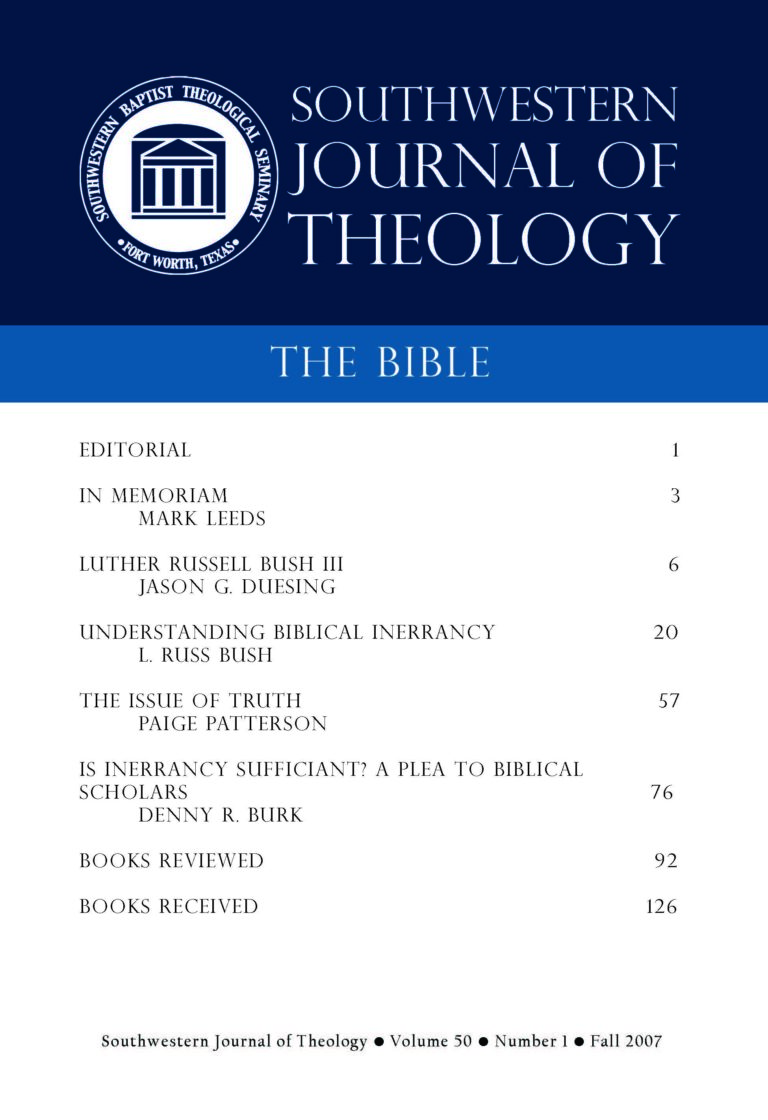
The Bible
Southwestern Journal of Theology
Volume 50, No. 1 – Fall 2007
Managing Editor: Malcolm B. Yarnell III
By Walter Brueggemann. Edited by Patrick D. Miller. Minneapolis: Augsburg Fortress, 2006. 255 pages. Hardcover, $35.00.
Reading Walter Brueggemann’s latest work on the prophecy of Jeremiah is at times inspiring and at other times frustrating. The book, edited by Patrick Miller, is a collection of some of his “older” journal articles and often reads more like lecture notes than written articles. Further, at $35.00, the book seems somewhat overpriced.
Some of the positive aspects of the volume are its discussion of recent scholarship of the book of Jeremiah, an explanation of the role of Jeremiah as a bridge between oral and written prophecy, the emphasis on the initiation of the message by God, and the role of hurt and hope in the prophet’s message.
The strength of the book is Brueggemann’s articulate and imaginative style. However, his prose often subtly undermines the text. For example, readers may marvel as he picturesquely highlights the person and work of the prophet Jeremiah. Throughout the book, he describes the prophet’s life, his context, his message, his difficulties, and his coming to terms with God’s call. The value of this description is Brueggemann’s emphasis that the message of the prophet demands and depends on the context in which
it was delivered. However, that strong affirmation is deflated by the author’s conclusion that Jeremiah was not necessarily a real person. In fact, he concludes that “any historical person of Jeremiah is in any case unrecoverable and that what we likely have in the text is an imaginative literary construct of the person and the prophet presented for interpretive reasons” (18–19).
Another example of a seeming contradiction in the work is his critique at one point of those who dismiss the historicity of the book claiming that they “loosen the text from history” (59). However, at another point, Brueggemann, who clearly espouses a minimalist view of the authorship of the book, is critical of those who are held “hostage” by their attempt to make the work historical.
In another place, Brueggemann is critical of those who dismiss the book as “unreadable,” (67–68) yet he later concludes that the book is “marked by a host of uncertainties that preclude a ‘readable’ commentary” (86).
One final example of a seeming contradiction in the book relates to the author’s view of the contemporary application of the message of Jeremiah. In a few places, he suggests that the message is applicable to everyone today. However, in his most extended discussion of the book’s contemporaneity, he asks the question, “Can this prophetic faith rooted in old treasured texts be credible in our situation?” (81) He cites four scenarios which, if true, render the message inapplicable, yet subsequently seems to avoid his own question in any concluding fashion.
On a couple of occasions in the text, Brueggemann attempts to give a definition of the role of a prophet. One of them lacks a key ingredient of prophetic utterances and the other seems too stereotyped to cover the range of prophets described in Scripture. In the first definition, he characterizes the prophets as “a series of human speakers . . . who were emboldened by holiness and who conceived of scenarios of possibility that ‘the rulers of this age’ had declared to be impossible” (77). The problem with this definition is that it makes the message one of the prophets’ own conception, rather than of divine origin. In the author’s second attempt to define the prophetic role, he states that a prophet is one “who stands outside the mainstream of public power and exposes what’s going on” (199). This is certainly true of Jeremiah; however, Moses, Samuel, Isaiah, and Daniel could hardly be described as “outside the mainstream of public power” (199).
At one point in the book, Brueggemann carelessly suggests a hierarchy in the church that he may not have intended. He begins a concluding paragraph with the sentence, “I don’t care whether you’re a pastor, a student, a lay leader, or just an ordinary Christian” (198). I hope he does not intend to suggest that pastors, students, and lay leaders are more important
or less ordinary that those who do not perform these functions. It is more likely just a poorly worded sentence.
Undoubtedly the weakest chapter in the book relates to his espousal of a negative view of American consumerism and militarism. The section seems over-stated and forced into the text for political purposes. Moreover, it is not the subject of the text he uses to support his views. The text is talking about the failure of priests and prophets, which he applies to this country’s business and military leaders. It is a disappointing and misplaced polemic.
Overall, the book lacks logical progression, seems poorly edited, is at times redundant due to the fact that it is a collection of previously written articles, and at other times appears contradictory.





